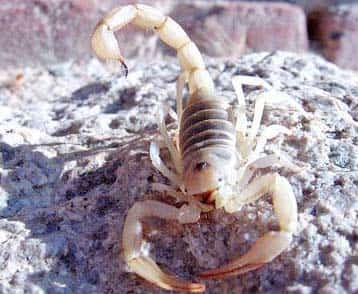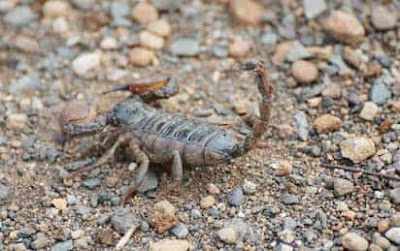Definition of Scorpion Sting
Scorpions are found everywhere thoughout the
globe that having a place with the Arthropoda own species, known by the
Arachnida category and are firmly concerned to Spiders, Ticks, and Mites.
Scorpions turn out during the summer and rainy seasons. It accompanies diverse
hues like tan shadings, light brown color, dark, black colored and so on. It
really is a very rare and exceptional incident.
Although about 1500 varieties of scorpion can be found on the earth, and
most scorpions are harmless, but 25-30 species are poisonous that may be fatal.
Although the high incidence of scorpion stings
affecting adults in many parts of the world but children are incredibly
sensitive to scorpion stings which can bring about the fatality. Scorpion venom
comprises protein toxin and enzymes that may convey hazardous condition and
deliver life-threatening situation, especially in kids. Scorpion stings are
common emergency events and are a very unusual incident in many tropical countries.
What are the Signs and Symptoms of Scorpion
Sting?
The signs and symptoms of Scorpion Stings usually
ranges from moderate to severe and
depend on the species of scorpion involved, age
(whether child, adult, or old), body-weight, body strength, and overall health
status of the individual.
In general, signs and symptoms of scorpion bite
maybe following -
Muscle twitching, thrashing, spasms or stiffness.
Anxiety, agitation, Restlessness, giddiness,
vertigo.
Swelling, intense pain, paresthesia, numbness,
burning and tingling sensation
around the sting site.
Drastic change in blood pressure - Hypertension -high blood pressure/hypotension - low blood pressure.
Convulsions.
Paralysis.
Lymphangitis and regional lymphadenopathy.
Abnormal, unusual, and random head, neck, and eye
movements
Tachycardia - Accelerated irregular heart beat.
Excitability.
Blurring of vision.
Anaphylaxis - Seizures, respiratory difficulties
like breathing troubles, absence of breathing,
increased respirations, hives, great weakness, nausea, and vomiting
Urination troubles like Less urine volume.
Diaphoresis - Increased sweating.
Sialorrhea - Excessive flow of saliva.
Tongue thickness.
Dysphagia - Difficulty in swallowing.
Loose stools and stomach ache.
Dribbling or drooling.
Risk Factors for Scorpion Sting
A scorpion stinging risk factors are following -
Location - Desert areas like India, South Africa,
Arizona, Mexico etc.
Seasons and environment especially in summer and
raining months.
Scorpions are often found inside internal part of
tree-bark (logs bark), dust-buckets, garbage pails, shoes, bedding, clothes,
luggage, and beneath the rocks.
Developing countries like India.
What is the Prognosis of Scorpion Sting & prospect for scorpion Envenoming
Generally, the prognosis is good with proper medication. Aside from this, the prognosis of scorpion sting is with regards to the patient's condition, health, weight, species of scorpion, stinging site, the seriousness of allergies etc. Scorpion sting may be switched fatal usually in children, older person etc. due to poor immunity power or in unattended conditions.
Sometimes, scorpion stings can prompt anaphylaxis that will require quick treatment.
By what method would Scorpion Sting be Prevented?
First Aid, Lifestyle & Prevention of scorpion
sting -
What do you do if you get stung by the scorpion?
Following steps or measures should be implemented to prevent a scorpion bite or
sting -
Scorpion Stings may be prevented by being alert
if you are in dangerous scorpion-infested locations.
Put clothes or shoes over the body in the wake of
shaking, checking out, and in-depth inspection.
Do not go for outside the house particularly
during the night in desert or jungle regions.
Always use pest control spray in areas of large
numbers of scorpions located.
Always wear shoes with socks, whole body covering
garments to prevent stinging of the scorpion.
Try not to access dark corners, alcoves, and nooks during the night time. If necessary, use gloves and shoes. If you
work in the backyard, lawn, garden, collect firewood or lift up logs, in that
situation put gloves too.
Avoid clutter deposition in garage, basement,
lawn, turf, shrubberies, grass, bushes, trash, planks, boards, logs,
bricks, rocks, stones, and other parts of the house, which will permit the
scorpion hide inside.
Avoid sleeping on the floor during camping.
Always use a mosquito net during sleeping time.
Scorpion Sting First Aid Treatment
Medical treatment for the greater part of
scorpion sting is usually not required though it's rather a smart thought to go
to an emergency department as a precautionary and supportive measure. In case
there is poisonous scorpion stinging, the sufferer needs prompt medical help.
So, try not to waste your time on self-applied medications and get an emergency
care at the earliest opportunity. Apart
from this, seek medical assistance immediately in the case of severe and
serious symptoms like nausea, vomiting, sweating, foam creation in the mouth,
involuntary urination,muscle spasms, giddiness, high blood pressure,
arrhythmia, irregular heart rate, heart failure, difficulty speaking,
breathing, allergic reactions etc. associated with scorpion envenoming or if
the sufferer is a kid or elder person.
Discover the sting location and a combination of
Ammonia/Ammonium Chloride (Nausadar) and onion juice should be applied around
scorpion bitten point to reduce stinging poison and relieve intense pain or
inflammation.
A tight bandaging should be employed above 4-6
inches of scorpion stung site, so just like a snake bite treatment to avoid the
venom from spreading. Remember, bandage neither be too tight and nor obstruct
able for blood circulation in the body.
Collect red phosphorus from matchsticks as soon
as possible and mix it with normal water then put it on scorpion stung site to
diminish harm impacts of venom.
Reassure, console, and relax the sufferer to
avoid possible faster heartbeat regarding scorpion bite.
Bed rest is necessary. Other than this, you may
need to take sedatives on account of muscular spasm and i.v. medications to
deal with hypertension, anxiety, pain etc.
Use cleaning soap and water to wash out the
stinging area.
Remove all jewelry items like ring, chain,
because tissue swelling may impede the blood circulation.
In the case of a nonpoisonous scorpion bite,
symptomatic and supportive treatment should be followed.
Oral analgesic like aspirin, paracetamol,
ibuprofen etc. may help to reduce swelling and pain worried about scorpion
bites.
For just recognition purpose, kill or catch the
scorpion and determine the species of scorpion because it helps the doctor for
appropriate management. Or take a snapshot if you can not capture the scorpion.
Passive
immunotherapy - Anti-scorpion venom should be given to the victim as earlier as
possible because it is effective as a curative treatment and preventive options
as well.
Antibiotics are of help in secondary infection,
concerned with scorpion bites.
Try to apply ice cubes on the stung region, if
unavailable, put a wet, cold cloth on the afflicted site because cold compress
helps decrease pain and slow down the spreading of venom.
Regarding allergies, antihistaminic drugs may be
beneficial on account of a scorpion
bite.
Try not to give any medicine to children without
getting an advice from a qualified doctor.
Make an effective distance from foods or liquids
if the patient experiencing difficulty swallowing.
How do you treat a scorpion sting?
Best Home Remedies For Scorpion Stings
Baking Soda - NaHCO3/sodium bicarbonate
Sesame Oil - Sesamum indicum
Peppermint Essential Oils - Mentha piperita
Calendula Salve - English marigold - Calendula
officinalis
Rosemary Essential Oils - Rosmarinus officinalis
Eucalyptus Essential Oils - Eucalyptus globulus.
Frankincense Essential Oil - olibanum - - Boswellia serrata
Lavender/Lavandula Essential Oils - Lavandula angustifolia
Amrapatra - Mango Tree Leaf - mangifera indica
Hing - Asafetida powder - Ferula assa-foetida
Lasuna - Garlic - Allium sativum
Mooli - Radish Poultice - Raphanus raphanistrum
Pudina - Mint Leaf Juice - Mentha rotundifolia
Pyaz - Onion Juice - Allium cepa
Papaya
leaves - Papaw - Carica papaya
Arjuna bark - Pentaptera arjuna/Terminalia arjuna
Chirchiri - Prickly chaff flower - Achyranthes
aspera
Mahua -Indian Butter Tree - Madhuca latifolia
Bichhu/Baghnakh - Martynia annua
Imali -Tamarind - Tamarindus indica
Bhringaraj - False daisy - Eclipta prostrata
References
---------------------------------------------------------
WRITTEN BY RAJESH KUMAR














No comments:
Post a Comment